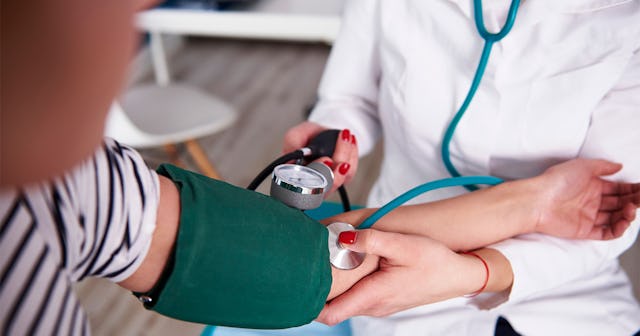Of Course Women's Blood Pressure Has Gone Up During The Pandemic

While it’s not surprising that women’s blood pressure has gone up, it’s extremely important to handle
Everyone has been under alarming amounts of stress during the pandemic. Women, in particular, have taken on a disproportional amount of work and worry over the past two years, from increased financial burdens to increased anxiety and depression. And the mental and physical strain of living in a world with COVID-19 is now showing itself in large medical trends—like the fact that the nation’s blood pressure has collectively gone up, especially for women.
This is a red flag that women are hurting their bodies and their long-term health just to get their through the day-to-day, and that continuing to function this way for much longer will have negative health effects for years to come.
A new study, published Monday in the research journal Circulation, found that everyone’s blood pressure has trended upward in the last year, but that women have especially seen a rise. It looked at data from almost a half-million Americans from every state who were part of company wellness programs, comparing readings from the same people over 2019 and 2020.
“We did see more pronounced increases in blood pressure in women,” study author Dr. Luke Laffin, co-director of the Center for Blood Pressure Disorders at Cleveland Clinic, tells CNN. “Now, we don’t know the exact reason for that. However, we do know and there’s data to suggest that the pandemic has tended to place more of an outsized burden on women, particularly women that work, and this is an employer-sponsored wellness program.”
The blood pressure increase was not related to weight gain, and both systolic and diastolic blood pressure readings increased, implying that blood pressure is going up for reasons that are more nuanced than just poor diet. Laffin believes that the higher numbers are related to stress surrounding the pandemic—stress that can lead to behaviors like eating less healthy food, losing sleep, drinking more alcohol, increasing salt intake, decreasing exercise, or stopping medication.
“We do know that in settings of chronic stress, really the changes in blood pressure are probably driven by some of the lifestyle choices we make when we’re stressed,” Laffin says.
You can lower your blood pressure by losing weight, exercising, eating healthy foods, limiting alcohol, limiting salt, limiting caffeine, stopping smoking, and getting good night’s sleep.
Of course, that’s easier said than done, the women of America are probably thinking, as they juggle work, tenuous childcare situations, quarantines, and isolation, among so much else.
“These are very important data that are not surprising, but are shocking,” Dr. Donald M. Lloyd-Jones, president of the American Heart Association, tells the New York Times.
Lloyd-Jones also believes there are many reasons for women’s rising blood pressure, but an important one not to overlook is that people have simply been ignoring their health or avoiding the doctor.
“It is probably multifactorial,” he says. “But I think a critical piece is that we know so many people lost contact with the health care system, and lost control of blood pressure and diabetes.”
Laffin agrees, adding: “During the pandemic, public health measures like vaccination and masks are clearly important, but probably equally important during a pandemic is not neglecting chronic risk factors for cardiovascular disease or chronic medical conditions. So, make sure that you’re doing healthy lifestyle things — seeing your medical provider regularly, taking your medicine, if you’re taking high blood pressure medicines, all very important.”